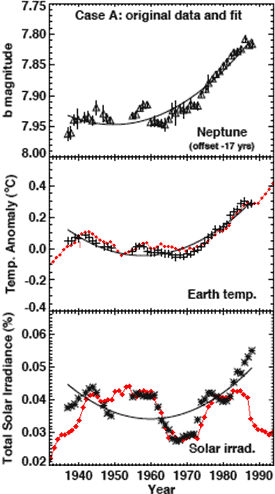
What The Science Says:
Neptune's orbit is 164 years so observations (1950 to present day) span less than a third of a Neptunian year. Climate modelling of Neptune suggests its brightening is a seasonal response. Eg - Neptune's southern hemisphere is heading into summer.
Climate Myth: Neptune is warming
In April 2007, Heidi Hammel published a study comparing Neptune's brightening to Earth's warming and solar variations. She concluded that while they don't correlate statistically, the patterns are visually compelling and planetary climate changes may be due to solar variations.
The crux of this study is the correlation between solar irradiance and temperatures on Earth and Neptune. However, the solar data comes from an erroneous TSI reconstruction by Peter Foukal that contradicts direct satellite measurements, sunspot numbers and solar radio flux or flare activity. Foukal used an uncalibrated sunspot dataset compiled from different observatories, which were unfortunately not consistent with each other. After 1976 when Greenwich Observatory stopped observing, Foukal found a rapid increase in irradiance, due to the fact that the sunspot areas recorded by the USAF's SOON network are too small.
Since then, Foukal has concluded that solar variations are too small to have contributed appreciably to accelerated global warming over the past 30 years. The reason Hammel used Foukal's outdated TSI reconstruction was she was unable to obtain a reliable TSI dataset dating back to the 1940's. The Max Planck Institute have constructed such a TSI dataset. Comparing it to Foukal's TSI as well as Earth's and Neptune's temperature plots (the red line is the updated TSI data) shows there is no correlation in solar activity over the past 30 years.

So if the sun isn't getting hotter, what's causing Neptune's warming? Neptune's orbit is 164 years so observations (1950 to present day) span less than a third of a Neptunian year. Climate modelling of Neptune suggests its brightening is a seasonal response (Sromovsky 2003). Eg - Neptune's southern hemisphere is heading into summer.
If you wish to determine whether solar variations are causing global warming on Earth, you're better off studying Earth's climate for which we have a wealth of data (as opposed to a single dataset of brightness levels over 50 years). You can check out the many studies of solar influence on Earth's climate on our page Are solar variations causing global warming?
 |
The Skeptical Science website by Skeptical Science is licensed under a Creative Commons Attribution 3.0 Unported License. |